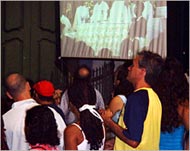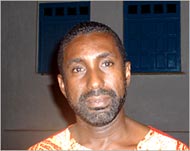Candomble: Brazil’s African religion
Just climb a hundred steps and you will enter a house in a white-painted building situated in a slum in the city of Salvador, in the state of Bahia, Brazil.

To many Brazilians, it is a sacred dwelling.
Inside a dark room, a priest peers over a solitary candle in a corner, dressed in white robes. Someone brings in a gigantic basket of colourful fruits and places it on a table. The atmosphere is one of serenity.
The priest sits behind a table bedecked with a circle of crystals, miniature idols and brilliant stones, which look as if someone has just emptied the contents of a treasure chest. Then he takes 17 seashells and rubs them in the palms of his hands while chanting an incantation in Yoruba, the language of Nigeria.
This is the Afro-Brazilian cult of Candomble. Its adherents believe that how the shells land will reveal how Orixa [their god] will guide and protect them through life.
|
“Our life with Candomble is very important as with any religion. It’s an oral tradition – we don´t have a written Bible – and has its roots in our African ancestors” Candomble priest |
Candomble is no arcane religion – it has millions of followers and has become a mainstream and respected practice.
Each New Year’s eve, Brazilians, dressed in white, cram on to the beaches to give offerings to the gods in the shape of boats filled with flowers and gifts which are pushed out to sea, embracing the rites of Candomble, despite the fact that Brazil is the world´s biggest Catholic country.
Worshippers buy all sorts of charms and trinkets to bring them good luck in the coming year. Huge emphasis is placed on the choice of offering, whether it be a miniature elephant or a bunch of white roses.
“During the consultation, I need to use all my powers of concentration,” says the priest, or Pai do Santos, Sivanilton da Mata.
 |
|
Watching an Afro-Brazilian mass |
“People come here with many problems and it is my duty to help them. It is hard work every day because I have a great responsibility to help everyone who comes here,” he says.
The turn of the year is a very busy time for him, he says, as people want to shed the troubles of the past year and prepare themselves for the new.
“Our life with Candomble is very important as with any religion. It’s an oral tradition – we don´t have a written Bible – and has its roots in our African ancestors,” he says.
Discrimination
This began when the Portuguese colonialists prohibited the imported slaves from practicing their own beliefs, so the slaves gave Catholic names to their African gods.
Some of the language and the drumming rituals that take place in Brazil have been lost in their original lands and many African priests actually travel to Brazil to learn their practice.
 |
|
Aiton Ferrera outside the house |
“We were discriminated against in Brazil and we suffered a lot. Even today, we suffer from discrimination,” he says.
The religion suffered from violent state crackdowns during the rule of President Vargas in the 1950s even though many of the persecutors were secret followers themselves.
Aiton Ferrera is a Candomble teacher.
“Until 1977 here in Bahia, performing drumming rituals on the streets was illegal and treated on par with drug-dealing and prostitution.
“Even now, the black poor will not admit to being Candomble. How is it that Bahia has the second largest black population in the world, second only to Nigeria, yet research shows that there are more followers of Candomble in Rio Grande do Sul, the most white state in Brazil?,” he adds.
|
“Until 1977 here in Bahia, performing drumming rituals on the streets was illegal and treated on par with drug-dealing and prostitution. Even now, the black poor will not admit to being Candomble” Aiton Ferrera, |
“Candomble is about reconstructing the family of the black poor in Brazil. Our houses are places to meet and reconnect,” he says.
He quotes the black culture minister Gilberto Gil: “The happiness of the black people is the happiness of the warrior.” The words are actually those of the poet Waly Salomao, who died last year.
In Candomble belief, 2004 is the year of the deity Oxossi, the hunter, who promises to bring riches, harmony and peace.
Families wipe themselves with seven leaves of their chosen plant on New Year´s Eve, which is said to wash the body, cleanse the soul, and get rid of evil spirits.
Oxossi, who is depicted in forest green with a metal bow and arrow, is one of three children of Iemanja, the goddess of the sea. He is believed to have left to pursue a life of meditation in the forest but never returned.